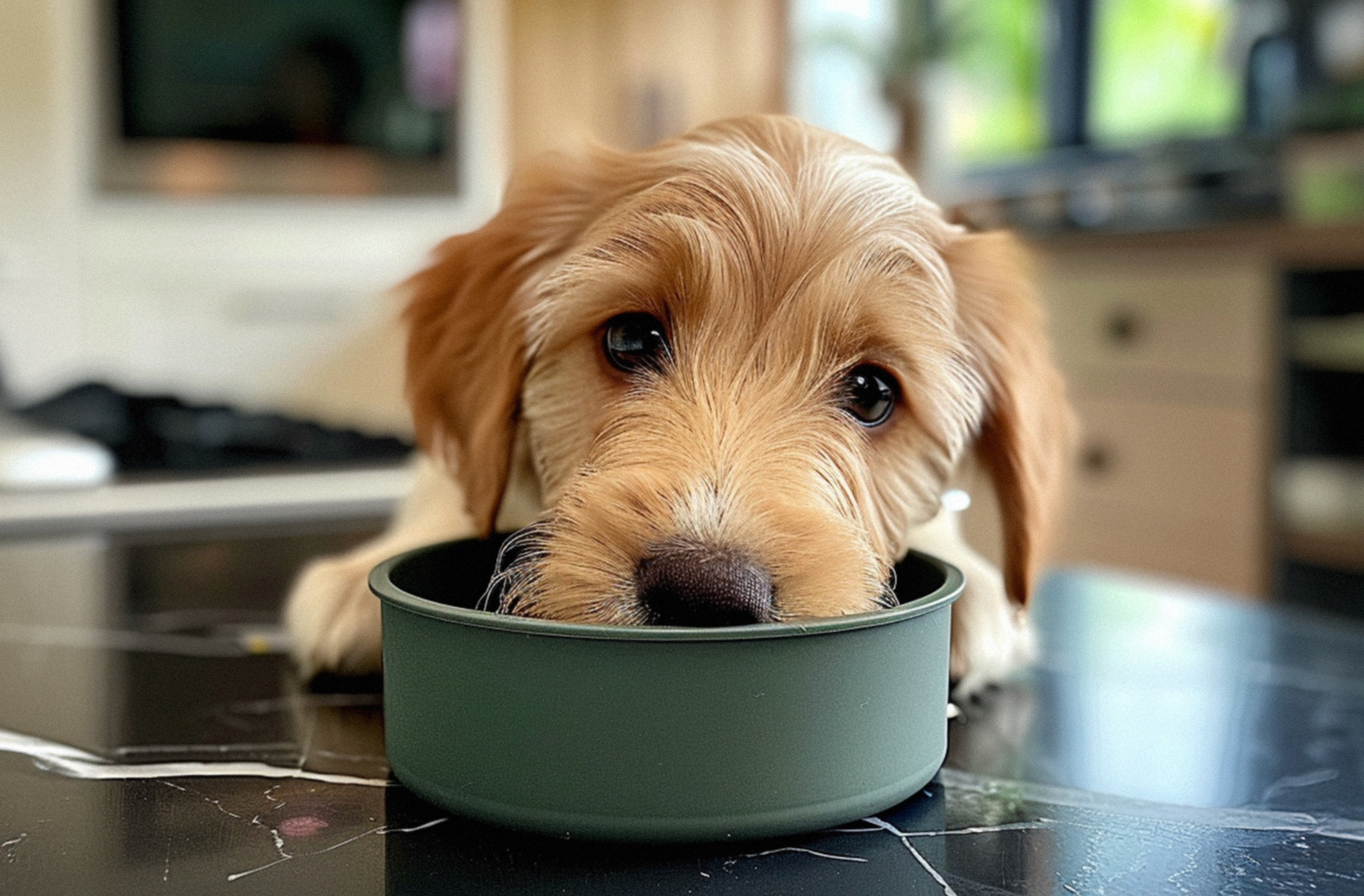Being a puppy parent means asking lots of questions: “Is this toy safe for my puppy?” “Does this harness fit properly?” “Which vaccines do they need?” But out of all of the questions puppy parents ask, one of the most common is, “What kind of food should I feed my puppy?”
A balanced diet is necessary for your puppy to grow up into a healthy, happy adult dog — but choosing the right food for them can bring up even more questions. Many puppy parents wonder if puppies can eat grain-free or dry food — and lots ask if it’s okay to feed their puppy adult dog food.
In this post, we’ll dive into the differences between puppy food and adult dog food, and answer the question, “Can a puppy eat adult dog food?”
What’s The Difference Between Puppy Food and Adult Dog Food?
Puppy food is much higher in calories than adult dog food and contains the appropriate nutrients to support your pup’s healthy development. Read on to learn more about the key differences between puppy food and food formulated for adult dogs.
Nutrients in Puppy vs Adult Food
As mentioned above, puppy food tends to be much higher in calories, and more nutritionally dense than adult dog food. This is because puppies need more calories per pound of body weight than non-pregnant or non-lactating adult dogs.
These extra calories aren’t just because puppies tend to be active — it’s also because a lot of a puppy’s energy is spent on growing. Most of your puppy’s growth occurs within the first three years of their life, and they need extra energy to support both physical growth and brain development.
Puppies also require a higher protein content in their food — they should get 22% of their calories from protein, while adult dogs only need 18%. Adult dogs can tolerate the higher protein content in puppy food, but it may cause them to gain weight so it’s best to avoid giving them puppy food. Puppies, on the other hand, should not consume adult dog food, as the insufficient protein content can cause developmental issues.
Besides extra protein, puppies also need 8.5% of their calories from fat to help regulate their body temperatures and keep their growing bodies functioning like they should. Adult dogs, however, only need 5.5% of their calories from fat. Adult dog food is formulated to help dogs maintain lean muscle mass, and doesn’t contain enough fat for puppies.
The final key nutritional difference between puppy food and adult dog food? Which vitamins and minerals are included. For example, puppies need a higher percentage of calcium (1%) and phosphorus (0.8%) in their food than adult dogs.
For more info, read our handy guide on understanding your dog’s life stage nutrition requirements.
Food Size
Another difference between puppy food and dog food is the size of the kibble. Your little pup requires smaller-sized kibble, so that they can easily bite and chew their food without the risk of choking.
Puppies don’t have all of their adult teeth yet — and their little puppy chompers just aren’t as strong as adult dog teeth. Puppy kibble is made to accommodate your puppy’s sensitive mouth (this is also why many puppy parents add water or puppy milk to their pup’s kibble to soften it).
Ingredients for Sensitive Stomachs
Puppies have very sensitive stomachs, and can be prone to digestive problems like diarrhea. Unfortunately, this is something that many puppy parents learn about the hard way. Puppy food is made with ingredients that are much easier on your pup’s digestive tract, and can help them avoid tummy troubles.
What Happens If My Puppy Eats Adult Dog Food?
Can puppies eat adult dog food? Well, if your puppy eats adult dog food once or twice, they’ll probably be just fine. However, feeding your young pup adult dog food over an extended period of time is not a good idea.
Adult dog food contains essential proteins, vitamins, and minerals to help fully-grown dogs maintain their weight and support their health. It’s not formulated with the proper nutrients or calories to help your puppy grow, gain weight, and support their muscle, bone and organ development.
If your puppy eats a diet of adult dog food, they may develop health issues like allergies, slow wound healing, or persistent infections down the road, due to a low-protein diet during puppyhood. It’s best to stick to food formulated for puppies, and help your little buddy grow up big and strong.
Understanding All Life Stages Dog Food vs. Adult Dog Food
When selecting a food for your furry friend, it's essential to understand the difference between “all life stages” dog food and adult dog food. Both have unique formulations that are tailored to meet distinct nutritional needs. But while adult dog food is only formulated to meet the needs of fully-grown dogs, all life stages dog food provides balanced nutrition for dogs of any age, including puppies. It contains the proteins, fats, vitamins, and minerals needed to support growing pups, senior dogs, and everyone in between.
Note that while puppies can eat all life stages dog food, they may require larger portion sizes to meet their higher caloric needs. Be sure to follow the feeding guidelines on your puppy’s food packaging to ensure that they get the right amount of food for their developmental stage.
Puppy food, on the other hand, is specifically designed to fit the needs of puppies. For example, it’s enriched with higher levels of calcium and phosphorus to support your pup’s bone and muscle development. Feeding your puppy a diet tailored to their growth specific stage, like puppy food, sets the foundation for a healthy and happy life as an adult dog.
When Should Puppies Stop Eating Puppy Food?
As your puppy matures, you can gradually begin to transition them from puppy food to adult food. Small breeds may transition to adult food at 9 to 12 months old, while large breeds should switch later, at 18 months, as they take longer to reach maturity.
As always, when transitioning your dog to a new food, it’s best to do it gradually. This will help your puppy avoid gastrointestinal issues like poor gut health, diarrhea, vomiting, and decreased appetite. Start by feeding your puppy 25% adult dog food and 75% puppy food, then gradually increase the amount of adult dog food over a period of 5-7 days until your puppy is fully transitioned.
Note that puppies with food allergies and sensitive stomachs may require more time to adjust to adult dog food. If your pup continues to experience diarrhea and vomiting after a prolonged transition period, talk with your vet.
Can I Give My Puppy Treats?
Our Beef Training Treats and Chicken Training Treats, are perfect for puppies — they have a soft, chewy texture pups love, and are low calorie for repeat rewarding during training sessions.
Dental chews are also good for helping keeping your puppy’s teeth clean — but they shouldn’t be given to puppies under 6 months old who still may have sensitive baby teeth.
Which Adult Food Should I Feed My Dog?
As you transition your puppy to an adult dog food, you’ll want to choose one that helps them maintain the strong nutritional foundation you set for them as a puppy.
Switching your pup to a lower-quality dog food may upset their digestive system, and won’t give them the nutrition they need to thrive.
Our Jinx premium all life stages dog foods are specifically designed to support your dog’s health throughout their lifetime, and provide them with:
- Premium proteins to promote strong muscles and joints, a shiny coat, and healthy skin.
- Patented probiotics to improve digestive health by maintaining a balanced gut flora and facilitating better nutrient absorption.
- Superfoods to promote a robust immune system and overall well-being.
So, Can Puppies Eat Adult Dog Food?
A good rule of thumb to follow as a dog parent: feed your pup a diet that’s suitable for their particular stage of life. That being said, it’s a good idea for puppies to eat food that’s specifically formulated for puppies. The same goes for adult dogs, senior dogs, and pregnant or lactating pups — each of these groups has specific nutritional requirements that need to be supported, and you’ll want to find a food that can give them what they need.
If you’re a first-time puppy owner, finding the right food for your puppy can sometimes feel overwhelming. Think of it this way: as long as you feed your puppy a food that’s high in calories and protein, and packed full of nutrients — like our Cage-Free Chicken Puppy Food — you’re doing great.
Welcoming a new friend into your home soon? Our Puppy Essentials Starter Pack contains everything you’ll need to make sure your puppy gets all the nutrients, vitamins, and minerals they need to grow into a healthy, happy adult dog.

